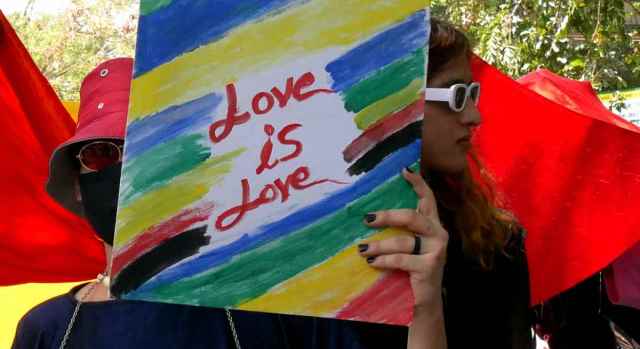Stay updated with the latest - Click here to follow us on Instagram
SC verdict on same-sex marriages: A timeline
Here's a look at the timeline of this case dealing with petitions seeking legal sanctity to same-sex marriage
 Pride parade of LGBTQ+ organized by Forum Foundation in Vadodara. (Exoress File Photo: Bhupendra Rana)
Pride parade of LGBTQ+ organized by Forum Foundation in Vadodara. (Exoress File Photo: Bhupendra Rana) After a long haul in courts by the same-sex couples, a five-judge constitution bench of the Supreme Court on Tuesday ruled against legalising same-sex marriage in a 3:2 verdict. Pronouncing its order on a batch of pleas seeking marriage equality in India, the five-judge constitution bench refused to tweak Special Marriage Act to recognise same sex marriages and said only legislature can do it.
Here’s a look at the timeline of this case dealing with petitions seeking legal sanctity to same-sex marriage
November 25, 2022: Two gay couples, Supriyo Chakraborty and Abhay Dang, and Parth Phiroze Mehrotra and Uday Raj Anand, moved the Supreme Court, seeking recognition of same-sex marriage under the Special Marriage Act. Following this, the court issued notices to the Centre and the Attorney General for India on the pleas.
December 14: The Supreme Court issued notice on another plea by a gay couple seeking legal recognition of their marriage in India. The petitioner, a 46-year-old Indian national, said he had got married to a US citizen in September 2010 in the US and registered their marriage in Pennsylvania, USA, in June 2014. The duo, residents of Pune, said their attempts to get their marriage registered under the Hindu Marriage Act, 1955, came to a naught as the Registrar of Marriages refused to grant their request.
January 6, 2023: The Supreme Court allowed the transfer of all the pleas seeking legal recognition for same-sex marriages pending before high courts across the country to itself. Multiple such petitions were pending before the Delhi and Kerala High Courts. Senior advocate Menaka Guruswamy had sought a transfer of these pleas from the HCs so they could be heard by the Supreme Court directly.
The top court posted the hearing of these petitions seeking recognition of same-sex marriage under various Acts, including the Special Marriage Act, Foreign Marriage Act and the Hindu Marriage Act, to March 13. The Centre was directed to file its response to the pleas by February 15.
The apex court also deputed Advocate Arundhati Katju as nodal counsel for the petitioners and Advocate Kanu Agarwal as nodal counsel for the government side.
January 30, February 10, February 20, and March 3: The Supreme Court issued notices on some more such pleas and attached them with the main case.
March 12: The Centre filed an affidavit opposing same-sex marriage in the Supreme Court pointing out that the “legislative understanding of marriage in the Indian statutory and personal law regime” refers only to marriage between a biological man and biological woman. Any interference “would cause a complete havoc with the delicate balance of personal laws in the country and in accepted societal values”, it said.
March 13: The Supreme Court referred to a five-judge Constitution Bench the petitions seeking legal recognition to same-sex marriages, saying the matter raises questions of “seminal importance”. In its order, a three-judge bench, headed by Chief Justice D Y Chandrachud, said the submissions on the issue involve the interplay between constitutional rights and specific legislative enactments, including the Special Marriage Act, besides the rights of transgender couples.
April 1: A body of Islamic scholars called the Jamiat-Ulama-i-Hind opposed the peitions seeking recognition of same-sex marriages. In its plea, the JUIH said, “Islam’s prohibition of homosexuality has been categorical from the dawn of the religion of Islam itself. The position of Islam with respect to the prohibition on homosexuality is undisputed and established.”
April 6: The Delhi Commission for Protection of Child Rights (DCPCR) advocated for recognition of marriage, filing an intervention application to assist the court on the impact of such marriages on children.
April 15: The Supreme Court notified the composition of the five-judge bench set up to hear the batch of petitions seeking legal recognition for same-sex marriage. Presided by Chief Justice of India D Y Chandrachud, the bench comprised Justices S K Kaul, Ravindra Bhat, Hima Kohli and P S Narasimha.
April 17: India’s national child rights body flagged concerns around adoption by same-sex couples. National Commission for the Protection of Child Rights (NCPCR). The NCPCR submitted that laws such as the Hindu Marriage Act, 1955, and the Juvenile Justice Act, 2015, do not recognise adoption by same-sex couples. The child rights body has referred to the bar on a single man from adopting a female child under the JJ Act, and stated that “to allow a gay couple to adopt a female child would be against the scheme” of the Act, Live Law reported.
April 18: The constitution bench began hearing a batch of petitions concerning the legalisation of same-sex marriages. While the petitioners argued that the fundamental rights of the LGBTQ community were being restricted, the government raised preliminary objections to the court hearing petitions seeking same sex marriage.
The bench said it would steer clear of the area of personal laws but will only examine if the right can be conferred under The Special Marriage Act (SMA), 1954. Crucially, in response to an argument that the “legislative intent” of marriage throughout has been a “relationship between a biological man and a biological female”, the apex court underlined that “there is no absolute concept” of a man or woman. The bench said that it will restrict itself to the SMA and not broaden the canvas adding it is better to proceed incrementally than to try and deal with it all together.
May 11: The bench reserved the verdict in the hearing that lasted for 10 days. The top court reiterated that it cannot ask Parliament to make a law or enter the realm of policy making. “There’s a constitutional doctrine that we have remained constant to — we cannot direct legislation, we cannot direct framing of a policy, we cannot enter the realm of policy making,” Justice S R Bhat, who was a part of the bench, said.
October 17: The Supreme Court, in its 3:2 verdict, said no to legalising same-sex marriage.







